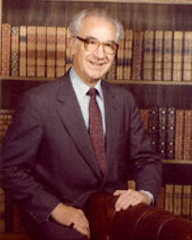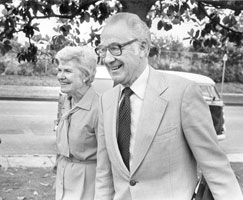
Rev. Melvin E. Wheatley Oral History
Part 1:
Part 2:
Part 3:
Part 4:
→ Transcript of Melvin E. Wheatley’s interview.
Biography
Bishop Melvin Ernest Wheatley, Jr. a champion of equal rights in the United Methodist Church, died March 1, 2009, after a prolonged illness. He was 93 years old. Recognized in 2000 with a proclamation by the City Council of Los Angeles for his pastoral leadership on the city's west side, Wheatley served for 18 years as senior pastor of the Westwood United Methodist Church. The same proclamation cited his national leadership on behalf of gay and lesbian persons.
Wheatley was born May 7, 1915, in Lewisville, Pennsylvania, to Melvin Ernest and Gertrude Elizabeth Mitchell Wheatley. Being born into a family of ordained Methodist clergy provided direction for his vocational path. He graduated from American University magna cum laude in 1936 and earned a B.D. degree summa cum laude from Drew Theological School in 1939. He married Lucile Maris, who also attended American University, in June 1939. He was ordained deacon by Bishop Edwin Holt Hughes in 1939 and elder in 1941 by Bishop Adna Wright Leonard in the Peninsula Conference of The Methodist Church He briefly pastored a congregation in Lincoln, Delaware and transferred to the California-Pacific Annual Conference in 1942.
As an associate pastor at a Fresno church during World War II, Mel and Lucile moved into the home of a Japanese-American family to protect it from vandals after they were ordered to an internment camp. He also served congregations in Modesto (1943-46) and Stockton (1946-54). He became pastor of Westwood Methodist Church in Los Angeles in 1954 where he served until he was elected bishop in 1972. He was active in a number of community efforts working for cross-cultural and interfaith dialogue and reconciliation. He received public notice for arranging a month-long pulpit exchange with the Rev. L.L. White, pastor of a prominent African American Methodist congregation (Holman). He also opened Westwood’s building to three synagogues needing space during construction on their buildings.
 Melvin & Lucile WheatleyUpon election as a bishop in The Methodist Church, Wheatley was assigned to serve the Denver Area. Spurred by his passion for justice and inclusiveness and the knowledge that his son John was gay, Wheatley took initial steps to build links with persons and groups advocating welcome for and nondiscrimination against lesbian and gay persons. The church’s growing antigay policies, exhibited by positions taken by the 1972 and 1976 General Conferences, drove Wheatley toward taking a stronger, more public stand. As the Council of Bishops met in Colorado Springs in 1978 and considered issuing a statement in support of the denomination’s discriminatory statements regarding homosexuality, Wheatley delivered an impassioned address to his colleagues in which he came out the parent of a gay son and indicated his strong opposition to the direction the church was taking regarding its gay and lesbian members.
Melvin & Lucile WheatleyUpon election as a bishop in The Methodist Church, Wheatley was assigned to serve the Denver Area. Spurred by his passion for justice and inclusiveness and the knowledge that his son John was gay, Wheatley took initial steps to build links with persons and groups advocating welcome for and nondiscrimination against lesbian and gay persons. The church’s growing antigay policies, exhibited by positions taken by the 1972 and 1976 General Conferences, drove Wheatley toward taking a stronger, more public stand. As the Council of Bishops met in Colorado Springs in 1978 and considered issuing a statement in support of the denomination’s discriminatory statements regarding homosexuality, Wheatley delivered an impassioned address to his colleagues in which he came out the parent of a gay son and indicated his strong opposition to the direction the church was taking regarding its gay and lesbian members.
In preparations for the 1980 General Conference, Wheatley made it clear to his episcopal colleagues that he could not, as a matter of conscience, support the “episcopal address,” their collective presentation on the state of the church, if it supported the status quo, i.e. discriminatory statements on homosexuality. The episcopal address was given to the assembly, including the sections objected to by Wheatley, and the names of all the bishops, including Wheatley’s, were published with it. Wheatley took the bold step of calling a special meeting of the Council the next day in which he reiterated his previous statements that he could not allow his name to be attached to such pronouncements. Wheatley said, “I will not accept [this statement]. It states as an absolute fact what is an insufficiently documented opinion: that gay persons can’t be Christians. The statement violates the laws of logic because one positive exception destroys a negative absolute. I personally know not one, but at least 50 gay men and lesbians who are Christians…I take Jesus Christ very seriously in making judgments, and the more seriously I take him the stronger is my feeling that this statement is an inadequate representation of Christianity.” Wheatley often spoke of his youngest son, John, who was gay, as being one of those most responsible for shaping his views. “Only when the rights of all family members are guaranteed are the rights of any family members assured.”
The subsequent public announcement by the Council that Wheatley’s name was being removed from the episcopal address thrust him into the public spotlight as an advocate for justice for gay and lesbian persons.
The following year the youth minister at First United Methodist Church Boulder, Julian Rush, came out to persons in his congregation. Wheatley backed Rush and his supporters in the congregation in their efforts to continue his ministry there. When Rush grew tired of the controversy and asked to be moved, Wheatley appointed him to the staff of St. Paul’s Church in Denver. This bold step of upholding the ministry of an openly gay clergy solidified Wheatley’s stance as a strong champion of gay and lesbian persons. It also resulted in widespread attack and criticism including charges filed against him for heresy and disobedience to church law by the pastor of three small churches in Georgia. A church investigative committee convened a hearing in early summer 1982 to review the accusations against Wheatley and his response. The committee concluded that there were insufficient grounds to continue to a church trial.
Increasingly isolated and ostracized by fellow bishops and other church leaders, Mel and Lucile sought and found community and spiritual care in pro-LGBT religious groups like Affirmation: United Methodists for Lesbian and Gay Concerns and in PFLAG (Parents and Friends of Lesbians and Gays). They also embarked on a speaking and teaching ministry to congregations and other United Methodist groups around the country to educate persons on homosexuality and advocate for full inclusion of lesbian and gay persons. This ministry continued even after Wheatley retired from the episcopacy in 1984. In principle and practice, Wheatley engaged a gay man and lesbian to also speak in these forums alongside him as often as possible.
During his career, Bishop Wheatley taught courses at academic institutions, gave the St. Luke's Lectures in Houston, was active in conference and national Methodist organizations, and authored several books and magazine articles. He was awarded honorary doctorates by American University and The University of the Pacific. He retired in 1984, returned to California and served for one year as Visiting Professor at The School of Theology in Claremont. During retirement, he and his wife Lucile concentrated their efforts on gay rights, actively working as members of the international organization of Parents and Friends of Lesbians and Gays (PFLAG) and as supporters of Affirmation and Reconciling Congregations within the United Methodist Church. He received the Ball Award from the Methodist Federation for Social Action and the 1985 Award for Prophetic Leadership by the Consultation on Homosexuality, Tolerance and Roman Catholic Theology; the 1985 Human Rights Award of the Universal Fellowship of Metropolitan Community Congregations; and the 2000 Lifetime Achievement Award from PFLAG in Denver, Colorado.
Wheatley is survived by his wife Lucile, and sons Paul and James, and three grandchildren. His youngest son John died of melanoma in 1984.
(This biographical statement was written by Mark Bowman in consultation with Melvin Wheatley with additional material from the family's statement following his death.)
Biography Date: revised February, 2010
Reproduction and Copyright
This interview with Mel and Lucile Wheatley happened on October 10, 1994. Mark Bowman had invited them to share recollections and documents re: their advocacy for gay and lesbian persons and taped this conversation with them in their home.
Additional Resources
Bishop Wheatley gave the keynote address at a Ministry & Homosexual Persons Conference, sponsored by J. Benjamin Roe's Ministry in Human Sexuality in Lincoln, Nebraska on February 28, 1986. An audio recording and transcript can be found at this link:
https://jbenjaminroe.com/jbr/writings/414-mhs-projects-and-activities
Profiles:
Archival Collections:
Tags
Methodist (UMC, United Methodist Church) | Ally | Church Trials | Clergy Activist | Ordination/clergy | Colorado | Denver | Wheatley, Bishop Melvin
Citation
“Rev. Melvin E. Wheatley | Oral History”, LGBTQ Religious Archives Network, accessed February 23, 2026, https://lgbtqreligiousarchives.org/oral-histories/melvin-e-wheatley.